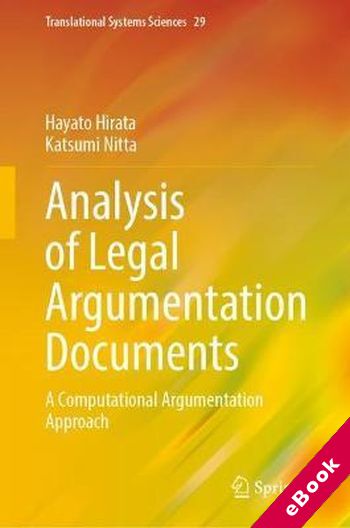
The device(s) you use to access the eBook content must be authorized with an Adobe ID before you download the product otherwise it will fail to register correctly.
For further information see https://www.wildy.com/ebook-formats
Once the order is confirmed an automated e-mail will be sent to you to allow you to download the eBook.
All eBooks are supplied firm sale and cannot be returned. If you believe there is a fault with your eBook then contact us on ebooks@wildy.com and we will help in resolving the issue. This does not affect your statutory rights.
This book introduces methods to analyze legal documents such as negotiation records and legal precedents, using computational argumentation theory.First, a method to automatically evaluate argumentation skills from the records of argumentation exercises is proposed. In law school, argumentation exercises are often conducted and many records of them are produced. From each utterance in the record, a pattern of "speech act +factor" is extracted, and argumentation skills are evaluated from the sequences of the patterns, using a scoring prediction model constructed by multiple regression analyses between the appearance pattern and the scoring results. The usefulness of this method is shown by applying it to the example case "the garbage house problem".
Second, a method of extracting factors (elements that characterize precedents and cases) and legal topoi from individual precedents and using them as the expression of precedents to analyze how the pattern of factors and legal topoi appearing in a group of precedents affects the judgment (plaintiff wins/defendant wins) is proposed. This method has been applied to a group of tax cases.
Third, the logical structure of 70 labor cases is described in detail by using factors and a bipolar argumentation framework (BAF) and an (extended argumentation framework (EAF) together. BAF describes the logical structure between plaintiff and defendant, and EAF describes the decision of the judge. Incorporating the legal topoi into the EAF of computational argumentation theory, the strength of the analysis of precedents by combined use of factored BAF and EAF, not only which argument the judge adopted could be specified. It was also possible to determine what kind of value judgment was made and to verify the logic.
The analysis methods in this book demonstrate the application of logic-based AI methods to the legal domain, and they contribute to the education and training of law school students in logical ways of argumentation.